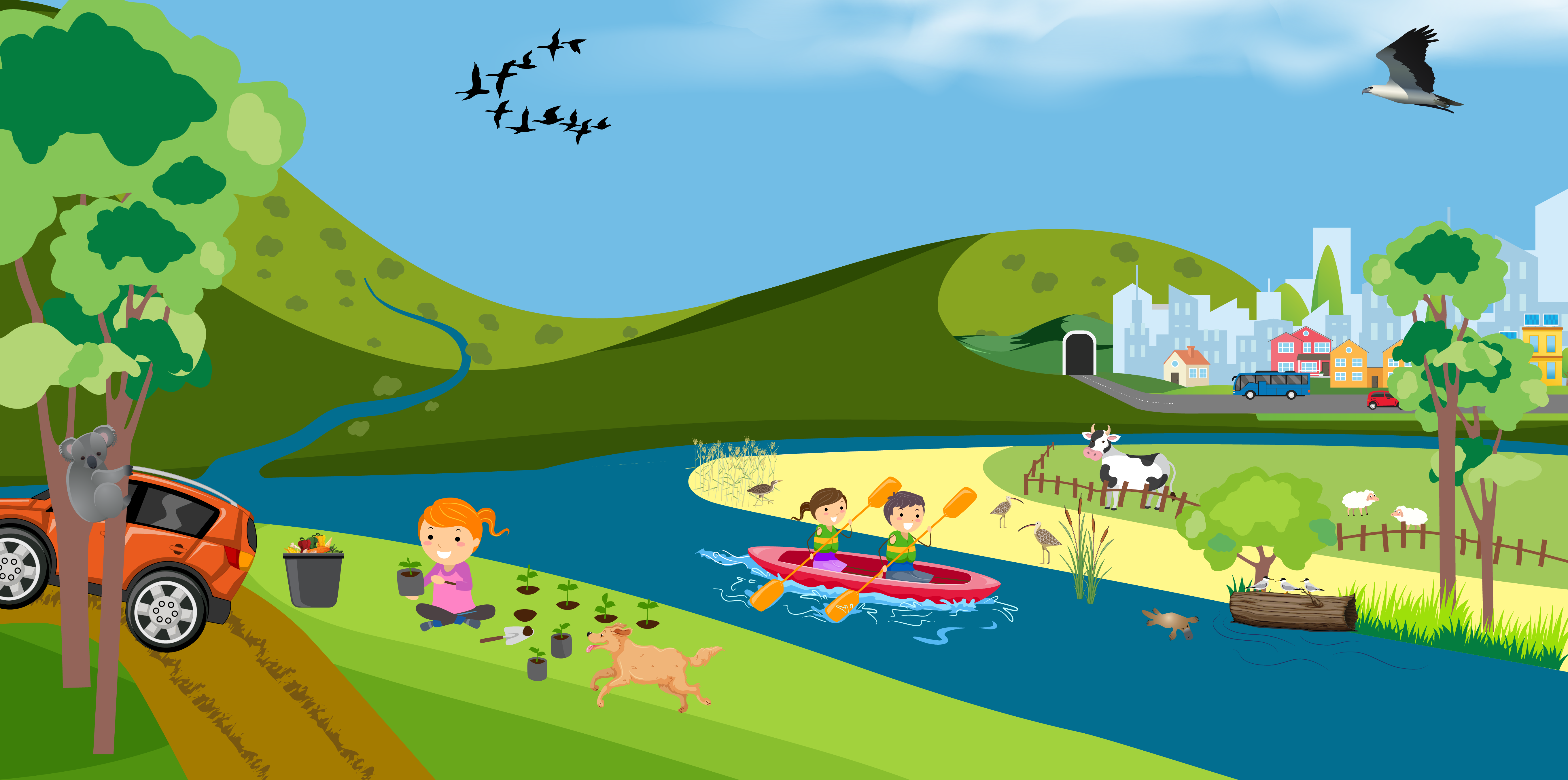
A Precious Resource
We need water in the home, on the farm, in schools and businesses. Water provides life-supporting sustenance through nourishment for both plants and animals as well as habitat to live in.
Of all the water on the planet, only 2.5% is freshwater and only 0.000147% of this is found in our rivers – not very much! That’s why it is extremely important to look after our rivers.
As water makes its way down our rivers, it picks up nutrients and sediment and transports them across the landscape. If we have too much nutrients and sediment in our rivers, they can become unhealthy. Unhealthy rivers leads to sick plants, animals and people.
National Water Week
National Water Week is the third week of October. It is a time when we make a splash across Australia, inspiring friends, families, communities and organisations to build awareness around the importance of water. Access to clean water is hugely important to our daily lives, and it’s down to all of us to protect our water environments and resources, and use water wisely.
Reimagining our Water Future in 2020
As our population grows, this will put more stress on our water resources, so how can we reimagine the way we use and reuse water to ensure there’s enough of it in the future? How can we rethink our current water practices to help conserve valuable water resources?
Race Down the River Board Game
In this activity you are going to learn about some simple actions that you can do, or things you should avoid doing at your place to help your local rivers.
Step 1
Go through the positive and negative actions outlined on the Activity Sheet and then play the game.
Step 2
You will need a dice and something to use as player tokens. Why not use gum nuts or a stone from the backyard as your individual player token.
Step 3
Download and print out a copy of the Race Down the River Board Game. Make it as large as you can.
Step 4
Play the game with some friends and see who wins. This game is just like snakes and ladders but with clean and dirty rivers that are based on your river actions. If you land at the top of a clean river (positive action), you can slide down to a lower point on the game. If you land at the base of a dirty river (negative action), you have to paddle back to the start of that brown stream before continuing
Positive Actions
You wash your car on the grass
Washing your car on the grass is better for the environment than washing it on a hard surface. When you wash your car on the grass, all the soapy water gets soaked up by the grass. When you wash it on a hard surface, the soapy water can flow down the stormwater drain and into a creek or river, causing pollution.
You lock your cat up at night
Pet and feral cats kill over two billion reptiles, birds and mammals per year in Australia. Keeping your cat inside at night stops them from hunting and killing native animals.
You fence off your riverbank
Fencing off the river from livestock helps stabilise the riverbank (reduces erosion) and allows important habitat to grow and thrive.
You plant trees next to the river
Trees create the air we breathe and keep our air healthy. They provide habitat for all sorts of animals. Trees also stabilise riverbanks to help reduce erosion..
You keep your dog away from turtles
Turtles play a key role in the river ecosystem. There are some turtles that are currently endangered and need our protection. Keeping your dog away from turtles helps ensure their survival.
You pick up your dog’s poo
Picking up your dog’s poo not only keeps an area looking nice, but you are also removing a source of nutrients that, when there is too much, can cause pollution problems.
You stay away from nesting birds
Nesting time can be very stressful for birds. Parents can abandon chicks if they feel threatened or chicks can get attacked by pets. Please Keep your distance.
You report fox sightings
Foxes are a feral pest. Report sightings using the FeralScan App or call your nearest Local Land Services office.
You control foxes on your farm
Foxes can cause a lot of damage to small livestock. If you have a problem with foxes, call your nearest Local Land Services office for help and support on managing this feral pest.
Negative Actions
You leave your rubbish behind
If you don’t put your rubbish in the bin, it can end up in a creek, river or the ocean. This causes pollution and can harm animals that live in the water.
You leave fishing line at the river
Fishing line can get caught around the feet, beak and/or head of birds, turtles and platypus, as well as around fish. This can cause animals to starve to death. Always dispose of fishing line properly and don’t leave tangles lying around.
You let your dog chase birds and dig up turtle eggs
A natural instinct for dogs is to hunt and chase. If you take your dog to the park, river, beach or bushland, keep it on a lead so it doesn’t chase or kill native animals, or dig up turtle eggs.
You remove logs from the river
Logs play an important role in the river – they provide habitat for aquatic animals, help reduce erosion by allowing sediment to build up and slow fast moving currents allowing other habitat plants to grow. It is best to leave logs and habitat in the river.
You let your cows in the river
When cows go in the river to drink, they squash plants and make the water muddy, making it difficult for fish and waterbugs to live. Cows also poo in the water, causing pollution – or should we say POO-LOO-TION!
Your car drips oil on the road
Oil gets washed from our roads into stormwater drains and rivers. This toxic chemical is harmful to our wildlife. Keep your vehicles serviced regularly.
You remove plants near the river
Trees next to a creek or river are important as they help stop pollutants from entering the water, provide habitat and shade. Tree roots hold the soil together which stops erosion.
You sweep lawnmower grass into the gutter
After you mow your lawn, sweep up any grass clippings left in the gutter and put them into the compost or green bin. This will stop them from ending up in the stormwater drain and reaching the creek, causing water pollution.
You run over a nest in your 4WD
Many waterbirds lay their eggs in a camouflaged nest on the ground. Don’t drive your vehicle on beaches or off designated areas, you’ll never know if a nest is there or not.
